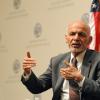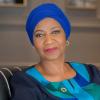Leading through perilous times
Breadcrumb
08:00 - 11:30, 14 July 2021
Online event
Open to the public
This event is free - follow the link below to register
Few leaders anywhere face situations as perilous as that which President Ashraf Ghani faces in Afghanistan, or as deeply entrenched as those facing Phumzile Mlambo-Ngcuke, the head of UN Women. Join us as we hear from these two thoughtful public leaders on the discipline that these perilous times require. As many of our societies face a daunting combination of violence and war, environmental catastrophe, unimaginable debt, and demagogues, take 3.5 hours this July to learn, discuss and debate the difference that good leadership can make.
Over the course of half a day, we will explore:
- How do public leaders lead, when they face truly grave perils for their country or their constituencies?
- What choices do they make?
- How do they communicate?
- How do they try to shape events when the threats appear larger than any leader can contain?
This virtual seminar is a live event, with some pre-recorded content. There are opportunities throughout the seminar for participants to interact with each other and with the faculty.
See below for the full list of featured speakers. The session will be chaired by Christopher Stone, Professor of Practice of Public Integrity at the Blavatnik School of Government.
Featured speakers
-
 His Excellency, President Ashraf Ghani of Afghanistan
His Excellency, President Ashraf Ghani of AfghanistanMohammad Ashraf Ghani grew up in Afghanistan before pursuing his education abroad. Like so many Afghans, foreign invasion and civil war led to the persecution of his family and forced him to remain in exile. Whilst abroad, he became a leading scholar of political science and anthropology and then worked at the World Bank where he learned the tools of international development. Following the fall of the Taliban in 2001, he returned to Afghanistan to devote his unique skills and knowledge to rebuilding the country. He advised interim President Karzai and served as the Finance Minister in the Transitional Islamic State of Afghanistan until December 2004.
During his tenure as Finance Minister, he designed a package of reforms and initiated several public investment programmes that led to significant improvements in the livelihoods of ordinary Afghans across the country. He declined to join the newly elected Government in December 2004. However, he remained an influential voice in political circles both in Afghanistan and abroad. He served as the chairman of the Transition Coordination Commission (TCC) in 2010, which was responsible for transferring authority from foreign to national troops. He resigned from TCC to run for president in October 2013. He was declared winner on 22 September 2014.
Image credit: US Institute of Peace
-
 Phumzile Mlambo-Ngcuka, UN Under-Secretary General and Executive Director of UN Women
Phumzile Mlambo-Ngcuka, UN Under-Secretary General and Executive Director of UN WomenPhumzile Mlambo-Ngcuka is United Nations Under-Secretary-General and Executive Director of UN Women. She was sworn into office on 19 August 2013 and brings a wealth of experience and expertise to this position, having devoted her career to issues of human rights, equality and social justice. Phumzile has worked in government and civil society, and with the private sector, and was actively involved in the struggle to end apartheid in her home country of South Africa.
From 2005 to 2008, she served as Deputy President of South Africa, overseeing programmes to combat poverty and bring the advantages of a growing economy to the poor, with a particular focus on women. Prior to this, she served as Minister of Minerals and Energy from 1999 to 2005 and Deputy Minister in the Department of Trade and Industry from 1996 to 1999. She was a Member of Parliament from 1994 to 1996 as part of South Africa’s first democratic government.
Phumzile began her career as a teacher and gained international experience as a coordinator at the World YWCA in Geneva, where she established a global programme for young women. She is the founder of the Umlambo Foundation, which supports leadership and education. A longtime champion of women’s rights, she is affiliated with several organisations devoted to education, women’s empowerment and gender equality.
She completed her PhD on education and technology at the University of Warwick, United Kingdom.
Image credit: Kea Taylor/UN Women
-
 Dapo Akande, Professor of Public International Law
Dapo Akande, Professor of Public International LawDapo Akande is a Fellow at Exeter College and co-director of the Oxford Institute for Ethics, Law and Armed Conflict (ELAC). Before moving to the Blavatnik School, he was Professor of Public International Law at Oxford Law Faculty and was, from 2012 to 2017, co-director of the Oxford Martin Programme on Human Rights for Future Generations. He has held visiting professorships at Yale Law School, the University of Miami School of Law and the Catolica Global Law School, Lisbon. He was the 2015 Sir Ninian Stephen Visiting Scholar at the University of Melbourne Law School’s Asia-Pacific Centre for Military Law. Before taking up his position in Oxford in 2004, he held positions at the University of Nottingham and the University of Durham, and from 1994 to 1998, he taught part-time at the London School of Economics and at Christ's and Wolfson Colleges, Cambridge.
Dapo has acted as a consultant, expert and advisor on international law issues to United Nations bodies, the African Union Commission, the Commonwealth Secretariat, and the Association of South East Asian Nations (ASEAN). He has provided advice to states and non-governmental organisations on matters of international law. He has acted as counsel, advocate, adviser and consultant in cases before the International Court of Justice, the International Tribunal for the Law of the Sea, the European Court of Human Rights, international arbitral tribunals in mixed disputes, and World Trade Organization and North American Free Trade Area Dispute Settlement panels. He has also acted as a consultant and advisor in cases in national courts, including the UK Supreme Court. From 2017 to 2018 he acted as legal advisor to the UK Parliament’s All Party Parliamentary Group on Drones' inquiry into the ways in which the UK works with partners on the use of drones.
-
 Maya Tudor, Associate Professor of Government and Public Policy
Maya Tudor, Associate Professor of Government and Public PolicyMaya Tudor’s research investigates the origins of stable, democratic and effective states across the developing world, with a particular emphasis upon South Asia. She was educated at Stanford University (BA in Economics) and Princeton University (MPA in Development Studies and PhD in Politics and Public Policy). She has held fellowships at Harvard University’s Belfer Center for Science and International Affairs, Oxford University’s Centre for the Study of Inequality and Democracy, and Stanford University's Center for Advanced Study in the Behavioral Sciences.
She is currently working on two book manuscripts: a comparative study of nationalisms and democracy in Asia and a critical review of nationalism research (Cambridge University Press). Her last book, The Promise of Power (Cambridge University Press, 2013), was based upon her 2010 dissertation, which won the American Political Science Association’s Gabriel Almond Prize for the Best Dissertation in Comparative Politics. The book investigates the origins of India and Pakistan’s puzzling regime divergence in the aftermath of colonial independence.
Before embarking on an academic career, Maya worked as a Special Assistant to Chief Economist Joseph Stiglitz at the World Bank, at UNICEF, in the United States Senate, and at the Bangladesh Rural Advancement Committee. A dual citizen of Germany and the United States, she has lived and worked in Bangladesh, Germany, France, India, Kenya, Pakistan, the Philippines, the United Kingdom and the United States.
